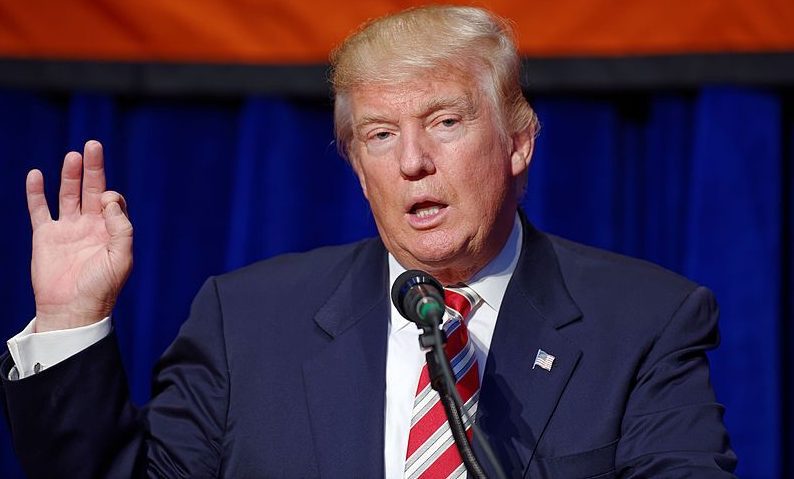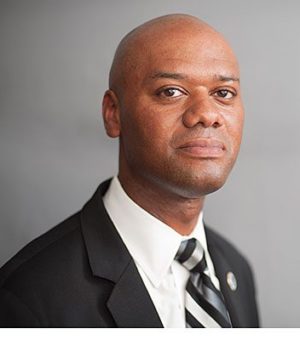
President Trump took his first policy-oriented steps to address the national outcry for police reform on Tuesday, signing an executive order that, among other things, establishes a federal database of police officers known for using excessive force.
The order would provide federal grants to police departments that track individual police officers on certain metrics—including excessive use-of-force complaints—and update their standards on credentialing and training. It would incentivize the use of social workers in police departments to deal with nonviolent encounters that involve substance use disorders, mental health, and homelessness. Through the new credentialing process, the president said, chokeholds will be banned “except if an officer’s life is at risk.”
“And I will say, we’ve dealt with all of the various departments and everybody said ‘it’s time,'” Trump said Tuesday.
The executive order prompted praise from law enforcement and criticism from others that insist the order doesn’t go far enough. Democrats in Congress recently unveiled their own bill to reform our nation’s policing, and Congressional Republicans are said to be developing their own bill. Last week, the House Judiciary Committee held a hearing on racial profiling and police brutality. The Senate Judiciary Committee on Tuesday also held a hearing on police use of force.
Here’s a breakdown of some key elements in the executive order:
Certification and Credentialing
- State and local law enforcement agencies must constantly assess and improve their practices and policies to ensure transparent, safe, and accountable delivery of law enforcement services to their communities. Independent credentialing bodies can accelerate these assessments, enhance citizen confidence in law enforcement practices, and allow for the identification and correction of internal deficiencies.
- U.S. Department of Justice discretionary grant funding will be allocated only to state and local law enforcement agencies that have sought appropriate credentials from a reputable independent credentialing body certified by the the Justice Department.
- Certified credentialing bodies must meet certain standards and address key topics in their reviews of police agencies, including policies and training regarding use-of-force and de-escalation techniques; performance management tools, such as early warning systems that help to identify officers who may require intervention; and best practices regarding community engagement.
Information Sharing
- A database will be created to coordinate the sharing of information among federal, state, local, tribal, and territorial law enforcement agencies concerning instances of excessive use of force related to law enforcement matters.
- The database will include a mechanism to track certain actions, such as terminations or de-certifications of law enforcement officers, criminal convictions of law enforcement officers for on-duty conduct, and civil judgments against law enforcement officers for improper use of force.
- The Department of Justice will hinge its allocation of federal discretionary funding on whether applying law enforcement agencies share the requested information for the database.
Mental Health, Homelessness, and Addiction
- The Department of Justice will identify and develop opportunities to train law enforcement officers for encounters with people who are homeless or are suffering from a mental illness or substance use disorder. The department will also pursue opportunities to increase the capacity of social workers working directly with law enforcement agencies and provide guidance regarding the development and implementation of co-responder programs, which involve social workers or other mental health professionals working alongside law enforcement officers.
- The U.S. Department of Health and Human Services will survey community support models that address these areas of housing and behavioral health and will report the results within 90 days of the executive order and offer recommendations of how appropriated funds could be redirected toward supporting successful models in jurisdictions across the country.
Legislation and Grant Programs
The Department of Justice will propose new legislation to Congress that would enhance the federal tools and resources available to improve law enforcement practices and build community engagement. Those enhancements would include:
- Providing technical assistance and training related to implementing improved use-of-force policies, including de-escalation techniques;
- Guidance on retaining and recruiting law enforcement officers who are likely to be “high-performing;”
- Providing access to mental health services for law enforcement officers;
- Providing programs that improve relations between law enforcement and the communities they serve, including listening sessions and community outreach efforts.
In response to growing calls for police reform in New Jersey, particularly following the shootings of Najee Seabrooks…
Read More Three Things to Know About New Jersey’s Groundbreaking Community Response Legislation
Three Things to Know About New Jersey’s Groundbreaking Community Response Legislation
In response to growing calls for police reform in New Jersey, particularly…
Read More Apply Now: Join a Learning Community for Community and Crisis Response Teams to Improve Responses to Youth
Read More
Apply Now: Join a Learning Community for Community and Crisis Response Teams to Improve Responses to Youth
Read More
 Apply Now: Join a Learning Community Focused on Substance Use and Overdose Community Response Programs
Read More
Apply Now: Join a Learning Community Focused on Substance Use and Overdose Community Response Programs
Read More














